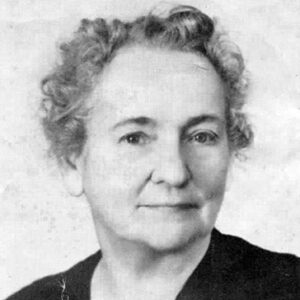calsfoundation@cals.org
Laura Cornelius Conner (1864–1952)
Laura Nancy Cornelius Conner was a prison reformer, educator, and farmer. In the 1920s, she served on the penitentiary board during the governorship of Thomas McRae. Conner was shocked by the conditions in the Arkansas prisons, but despite support from prisoners, community leaders, and legal experts, she was unable to make progress in reforming the penitentiary. She returned to her hometown, where she was an educator and planter until her death.
Laura Cornelius was born on October 24, 1864 in Augusta (Woodruff County). She was one of eight children born to William Cornelius and Arabella White Cornelius. Arabella Cornelius died when Laura was three. After the death of her father in 1876, Laura moved in with her sister Ella and Ella’s husband, Junius N. McCurdy. She was educated at public schools in Augusta and at the now defunct Bellewood Female Seminary in Anchorage, Kentucky. After her schooling, she returned to Augusta, where she became a teacher. On January 28, 1886, she married Emerson Hall Conner, a prominent planter and banker in Augusta. The couple had six children. Emerson Conner died in 1904.
Laura Conner is perhaps best known for her work with the penitentiary board during the governorship of Thomas McRae. In 1912, Arkansas had outlawed the convict lease system, and four years later, Tucker prison farm was built. Problems at the prisons, however, became widely publicized. The penitentiary system—which then consisted of Tucker, Cummins, and “the Walls” in Little Rock—had a reputation for brutality. In 1921, Conner was appointed to the Honorary Penitentiary Commission, which was authorized by an act of the Arkansas General Assembly of 1921. Conner, in this position, became an advocate for reform, and in articles published in the Arkansas Gazette in 1921, she addressed the problems at the prisons and the need for positive change. Conner was appalled by the physical abuse of prisoners, the use of profanity, and sexual abuse. She called for improved sanitation, reduction in corporal punishment, better food, and religious instruction. Conner also accused Dee Horton, warden at Tucker, of fathering a child with an African-American prisoner and house worker.
Conner received many letters of support from men and women across the state, including ministers, labor leaders, the Young Women’s Christian Association (YWCA), temperance advocates, and lawyers. Conner also had support from former prisoners, individual citizens, and prominent politicians such as Senator Hattie Caraway. Conner visited with prisoners personally, even though guards would not let her talk to inmates in privacy.
The Rotary Club of Pine Bluff (Jefferson County) eventually launched an investigation into prison conditions at Tucker, but the verdict was that there were no instances of “inhumanity” at the prison. The prison commission, which was all male except for Conner, ultimately did not support Conner in her efforts. Frustrated, she stopped attending meetings, and on February 3, 1922, she wrote to the governor, tendering her resignation from the Honorary Penitentiary Board. She claimed that other board members were running the prisons to “suit themselves” and were a “law unto themselves.”
Despite her efforts to end corruption and brutality at the penitentiary, Conner did not seek to disrupt the racial status quo. In fact, she opposed efforts to abandon one of the prison farms in order to put black and white convicts on a single plantation, where they would live and work together, thus saving the state money.
After her resignation, Conner remained active in the debate over prison conditions. Conner responded to a June 16, 1922, article published in the Arkansas Gazette that claimed Tucker farm was well managed by reiterating her claims that abuse at the farms was rampant and scandalous. Despite her efforts, the status quo reigned at the prisons. No serious reforms would take place until the administration of Winthrop Rockefeller.
Conner’s most lasting legacy involved her work with education. She was a lifetime school board member in her hometown. Laura Conner High School in Augusta is named after her. Conner donated the land on which the school was built. The original school was opened in 1911 but was torn down and rebuilt in the mid-1960s.
Conner also was interested in agriculture and had a prized grove of pecan trees, most of which she planted herself. She remained active in her community until the end of her life. In the late 1940s, students of Conner High School called her “a constant and inspiring friend of the youth of Augusta.” She died on May 27, 1952, and is buried at Augusta Memorial Park.
For additional information:
Herndon, Dallas Tabor. Centennial History of Arkansas. Vol. 3. S. J. Clarke Publishing Co., 1922.
Laura Cornelius Conner Papers. Butler Center for Arkansas Studies, Central Arkansas Library System, Little Rock, Arkansas.
Smith, Ryan Anthony. “Laura Conner and the Limits of Prison Reform in 1920s Arkansas.” Arkansas Historical Quarterly 77 (Spring 2018): 52–63.
Colin Woodward
Stratford Hall
 Early Twentieth Century, 1901 through 1940
Early Twentieth Century, 1901 through 1940 Politics and Government
Politics and Government Laura Conner
Laura Conner 




Comments
No comments on this entry yet.